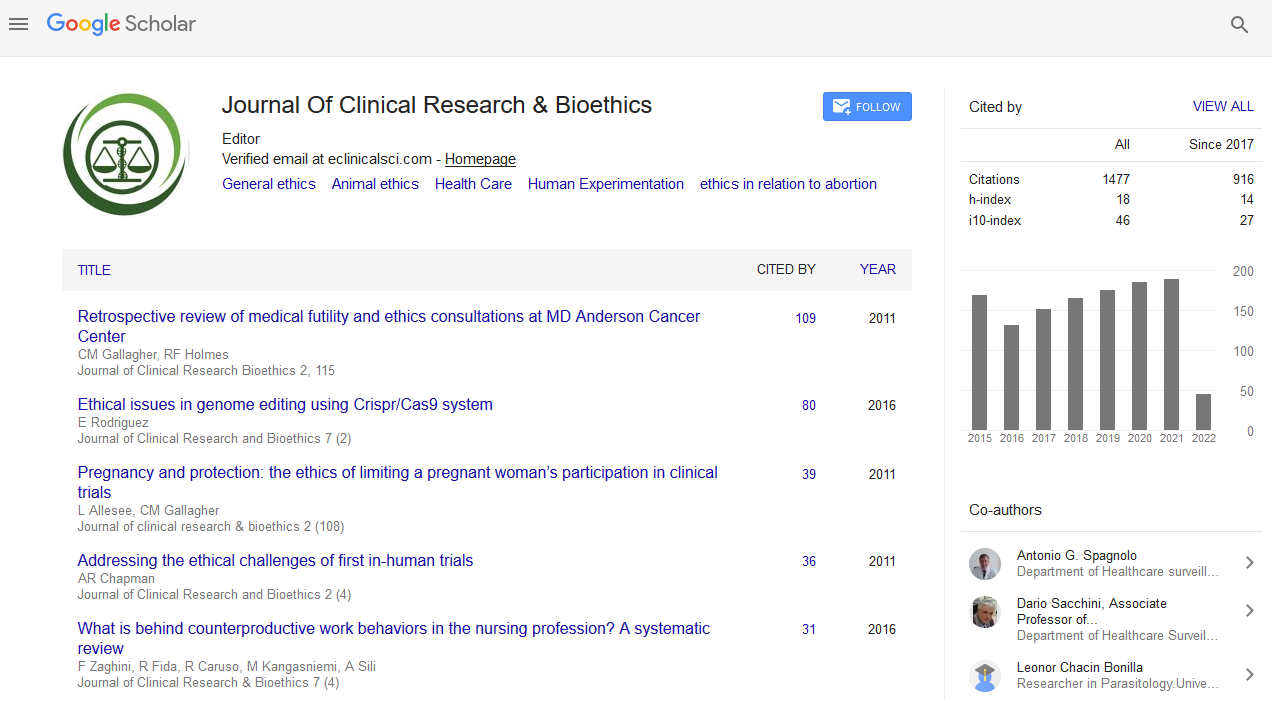PMC/PubMed Indexed Articles
Indexed In
- Open J Gate
- Genamics JournalSeek
- JournalTOCs
- RefSeek
- Hamdard University
- EBSCO A-Z
- OCLC- WorldCat
- Publons
- Geneva Foundation for Medical Education and Research
- Google Scholar
Useful Links
Share This Page
Journal Flyer

Open Access Journals
- Agri and Aquaculture
- Biochemistry
- Bioinformatics & Systems Biology
- Business & Management
- Chemistry
- Clinical Sciences
- Engineering
- Food & Nutrition
- General Science
- Genetics & Molecular Biology
- Immunology & Microbiology
- Medical Sciences
- Neuroscience & Psychology
- Nursing & Health Care
- Pharmaceutical Sciences
Abstract
Knowledge and Perceptions of Health Workers’ Training on Ethics, Confidentiality and Medico-Legal Issues
Bernard Asamoah Barnie, Paa Kobina Forson, Mercy Naa Aduele Opare-Addo, John Appiah-Poku, Gyikua Plange Rhule, Yaw Adu-Sarkodie and Peter Donkor
Introduction: Health care delivery in recent times has become more complicated, as patients expect health personnel to not only provide professional services but be accountable as well. It is thus imperative that health personnel are aware of their responsibility to the patient and also sensitive to medico legal issues if quality health care is to be assured.
Objective: The aim of the study was to assess the knowledge and perception of health care workers on their training in ethics, confidentiality and medico-legal issues. It was expected that the results would inform policy on the training of the health workers.
Method: A cross-sectional survey was conducted among some categories of health workers (Doctors, Nurses and Health care assistants) at the Accident and Emergency directorate of Komfo Anokye Teaching Hospital, Ghana. A self-administered questionnaire was used to elicit information on ethics, confidentiality and medico- legal issues. Data collected was analyzed using SPSS version 16.
Results: A total of 103 health care workers were enrolled on the study representing 96% response rate. The study revealed that 74% had knowledge on ethics, confidentiality and medico- legal concepts; and 35.4% of the respondents indicated that health workers attitudes to ethics, confidentiality and medico- legal concepts was inadequate. About 28.3% indicated that their attitudes were good while 26.3% indicated attitudes were adequate with only 2% indicating that attitudes were very good. Nearly, 49% of the respondents also indicated that training on medico-legal issues should be taught during formal training and also on-the-job.
Conclusion: Knowledge of health workers on ethics confidentiality and medico-legal issues is high and their perceptions are positive. However, regular training to update their knowledge will be necessary in order to ensure continuous improvement of the quality of health care delivery.


